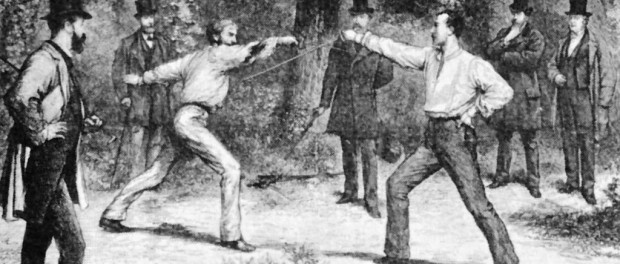You Can’t Provoke a Duel & Other Quebec Curios
 Godefroy Durand, "The Code Of Honor—A Duel In The Bois De Boulogne, Near Paris", from Harper's Weekly, 1875.
Godefroy Durand, "The Code Of Honor—A Duel In The Bois De Boulogne, Near Paris", from Harper's Weekly, 1875.
Some people like to forget it, but Quebec still follows Canadian laws. The Criminal Code is no exception. This massive monstrosity is (badly) organised into twenty-eight parts that make up all of the crimes you can be charged with in Canada. Every. Single. One.
“Criminal law” (actual criminal laws) and penal law are two different facets of the same domain (also called penal law). Criminal laws, of which the Criminal Code is composed, are under the jurisdiction of the federal government, while the federal and provincial governments can both engage in the creation of penal laws. Penal laws sanction certain behaviours in order to make sure that laws are followed (think traffic laws), while criminal laws are there to sanction a person who has committed a crime as defined in the Criminal Code, and has consequently harmed others people’s rights.
While there are articles and sections very relevant to today’s situation, there are just some articles in there that makes one wonder. For instance, duels, an ancient custom going back to the medieval era that is fundamentally based on a the concept of honour, is still in the Canadian Criminal Code. Duels were essentially a battle to regain the “lost” honour of the person who would engage in the duel. A notable duel happened in 1804, that is, between the two men Alexander Hamilton and Aaron Burr, ending in the death of the former. The last fatal duel in Canada happened in 1833, between law students Robert Lyon and John Wilson, also resulting in the death of the former. Apparently it was, as most things are today, over a case of hurt feelings/hormones: they were fighting for the love of a local schoolteacher. Mrs. Wilson, as the name suggests, picked the lawyer that survived.
Gone are the days of the swashbuckling drama of Scaramouche (the movie version from the 1950s has a seven-minute duel between Stewart Granger and Mel Ferrer), but apparently not the article for the Criminal Code, it seems. You can be put in prison for challenging, attempting to provoke, or participating in a duel for a maximum of two years. There is a purpose, of course, in including things such as duels in the Criminal Code: to prohibit these actions. And maybe some day, some way, two people might get together and decide to engage in a duel, and this article in the Criminal Code might apply. Yet considering the last fatal duel in Canada happened in 1833, does it not look a bit archaic? Nonetheless, be careful out there. En garde!





